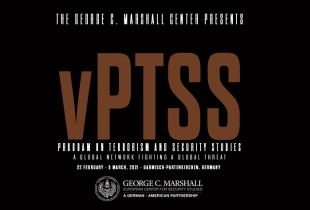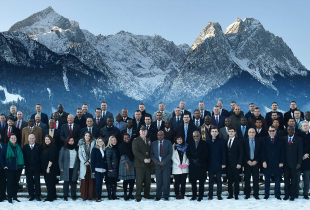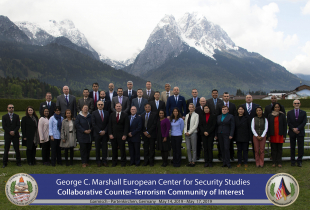
Marshall Center Participants Learn about Jihadist Foreign Fighters
By Christine June
Public Affairs Office
George C. Marshall European Center for Security Studies
GARMISCH-PARTENKIRCHEN, Germany (July 19, 2016) – Dr. Sam Mullins, professor of Counterterrorism at the George C. Marshall Center for Security Studies, gave a presentation on “Jihadist Foreign Fighters: Threat and Response” July 18 during the Program on Terrorism and Security Studies.
Mullins talked about foreign fighters’ current situation, profiles, motivations and recruitment, activities, returnee threat assessment, counter-options and challenges for counterterrorism.
Profiles of foreign fighters included young males, significant number of females - up to 35 percent, wide variety of backgrounds to include religious knowledge, education and employment, said Mullins, who has been lecturing on terrorism and counter-terrorism since 2009, primarily for international military, intelligence, law enforcement and security professionals.
Talking about returnee threat assessment, Mullins said that about 30 percent of Foreign Fighters have returned home, but most are not caught or prosecuted. He talked about the major Foreign Fighters attacks such as the two attacks in Tunisia in March and June 2015 with 60 dead, France in November 2015 with 130 dead, and in Belgium in March 2016 with 32 dead.
Following his presentation, Mullins moderated an alumni discussion panel on Foreign Fighters.
Tunisian army Maj. Dhaoui Sadok, from Tunisian Intelligence and Security Agency for Defense and Marshall Center alumnus, was the first panel member. He presented “Foreign Fighters from Tunisia.”
His goal was to have the PTSS participants understand the Tunisian Foreign Fighters’ phenomenon and lessons learned from the Tunisian’s experience with Foreign Fighters.
Local causes, he said, were past terrorist activities and post Tunisian revolution to include loss of border control, police intelligence network shutdown, unemployment crisis and economic recession. Other causes were geopolitical such as the economic crisis in Europe and the instability in Libya, and ideology causes such as defending Islam, humanitarian and defending abused Muslims in Palestine, Syria, Iraq and Burma.
The other panel member was Dr. Cuneyt Gurer, also a Marshall Center PTSS alumnus, and 20-year law enforcement professional who has worked on projects for Organization for Security and Cooperation in Europe, who presented the “Foreign Fighter Threat in Turkey.”
He talked about individual level explanations (motives to join and leave), societal background (culture, religion and ethnicity), state responses (politics, institutions and policies), regional developments (Syria and beyond), and Global commitments and pressures.
He talked about Turkey’s borders, longest of which is with Syria. “We are the gateway to the West and East,” Gurer said.
Gurer talked about security risks, such as refugees, travelers and homegrown.
More alumni panel discussions will take place today (July 19) in PTSS including with the topic on “Camps, Refugees and Migrants” with Gurer and other alumnus, Maj. Rabih Fakih.
More PTSS 16-12 photos can be found on the Marshall Center Photo Gallery.


